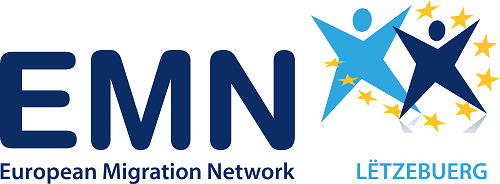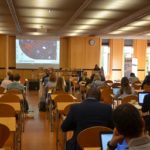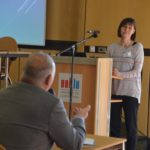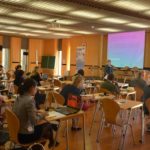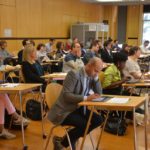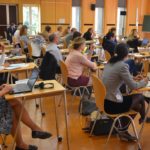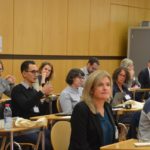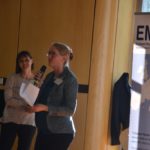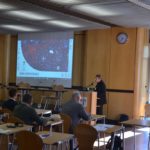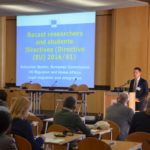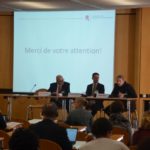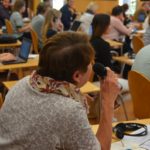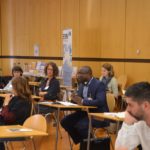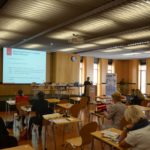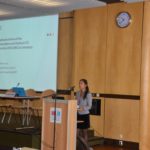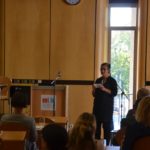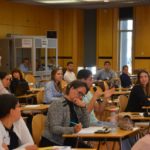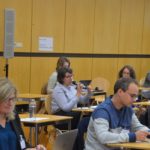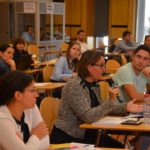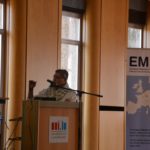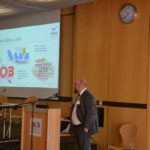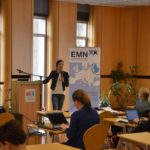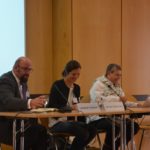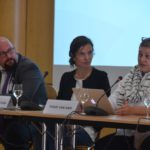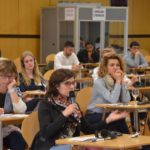**SCROLL DOWN FOR ENGLISH**
PDF PRESENTATIONS AVAILABLE AT THE BOTTOM OF THE PAGE
Le 28 septembre 2018, le point de contact luxembourgeois de l’EMN a tenu la conférence annuelle « Attirer et retenir les étudiants et chercheurs ressortissants de pays tiers » à Luxembourg.
Avec les discours de bienvenue de Laure Amoyel (Responsable de la Division Intégration et Diversité auprès de l’Office Luxembourgeois de l’Accueil et de l’Intégration (OLAI)) et Tonie Van Dam (Vice-Rectrice pour la formation doctorale, les questions de genre et les relations internationales, Université du Luxembourg) et le keynote speech de Johanna Waters (University College London), la conférence a déliberé sur la nouvelle directive étudiants et chercheurs (UE) 2016/801, qui vise à faire de l’Union européenne un centre mondial d’excellence pour les études et la formation, tout en favorisant les contacts entre les personnes ainsi que leur mobilité.
Le premier panel, intitulé “Students and Researchers Directive: Rationale and Implementation”, a compté sur la participation de Sebastian Stetter (Unité Migration Legale et Intégration Unit (B.1) auprès de DG HOME de la Commission Européenne) et Tom Goeders (Chef de service du Service Etrangers auprès de la Direction de l’Immigration du Ministère des affaires étrangères et européennes, Luxembourg), et a été modéré par Ralph Petry (Université du Luxembourg). Ce panel a mis l’accent sur l’importance d’attirer et de retenir les étudiants et les chercheurs ressortissants de pays tiers pour remédier aux pénuries de compétences en donnant un aperçu de la mise en œuvre et de la logique de la nouvelle directive.
Dans le deuxième panel, “Good practices and challenges in EU Member States”, André Bryntesson (Université d’Uppsala), Mirjam Monteiro (Office Fédéral pour l’Immigration et les Réfugiés (BAMF), Allemagne), Tesseltje de Lange (Université d’Amsterdam) et Marion Pajumets (Université de Tallinn) ont donné un aperçu des stratégies utilisées dans d’autres États membres pour renforcer l’attractivité de leur système national d’enseignement supérieur, en soulignant les éventuels défis et bonnes pratiques pour les différents États membres ainsi que pour les universités qui naviguent entre recrutement international et règlements en matière d’immigration. Le deuxième panel a été modéré par Johanna Waters.
Le dernier panel de la conférence, “Good practices and challenges in Luxembourg”, a donné la parole à Tonie Van Dam (Vice-Rectrice pour la formation doctorale, les questions de genre et les relations internationales, Université du Luxembourg), Laurent Peusch (Chef de service adjoint du Service Employeurs auprès de l’Agence pour le développement de l’emploi (ADEM) et Basak Baglayan (chercheuse invitée à l’Institut Max Planck et anncienne étudiante de doctorat à l’Université du Luxembourg), qui ont, sous la modération d’Emilia Kmiotek-Meier (Université du Luxembourg), débattu du contexte national en analysant les pratiques communes au sein de l’Université du Luxembourg et d’autres acteurs.
(English)
On September 28th the LU EMN National Contact Point hosted its Annual Conference on “Attracting and retaining third-country national students and researchers” in Luxembourg.
With welcome speeches by Laure Amoyel (Head of the Integration and Diversity Unit, Luxembourg Reception and Integration Agency (OLAI)) and Tonie Van Dam (Vice-Rector for Doctoral Education and Training, Gender and International Relations, University of Luxembourg) and the keynote speech by Johanna Waters (University College London), the conference debated the new directive for students and researchers (EU) 2016/801, which aims to make the European Union a global center of excellence for education and training, while promoting people-to-people contacts and their mobility.
The first panel, titled “Students and Researchers Directive: Rational and Implementation”, welcomed presentations by Sebastian Stetter (Legal Migration and Integration Unit (B.1) of DG HOME of the European Commission) and Tom Goeders (Head of Foreigners Unit at the Directorate of Immigration of the Ministry of Foreign and European Affairs, Luxembourg) and was moderated by Ralph Petry. This panel emphasized the importance of attracting and retaining third country students and researchers to address skills shortages by providing insight into the implementation and rationale of the new directive.
In the second panel, “Good Practices and Challenges in EU Member States”, André Bryntesson (Uppsala University), Mirjam Monteiro (Federal Office for Migration and Refugees (BAMF), Germany), Tesseltje de Lange (University of Amsterdam) and Marion Pajumets (University of Tallinn) gave an overview of the strategies used in other Member States to make their national higher education system more attractive, highlighting possible challenges and good practices for the different Member States as well as for universities that navigate between international recruitment and immigration regulations. The second panel was moderated by Johanna Waters.
The last panel of the conference, “Good Practices and Challenges in Luxembourg”, gave the floor to Tonie Van Dam (Vice-Rector for Doctoral Education and Training, Gender and International Relations, University of Luxembourg), Laurent Peusch (Deputy Head of the Employer Service of the Agency for the Development of Employment (ADEM)) and Basak Baglayan (guest researcher at the Max Planck Institute and former PhD student at the University of Luxembourg), moderated by Emilia Kmiotek-Meier, discussed the national context by analyzing common practices within of the University of Luxembourg and other actors.
